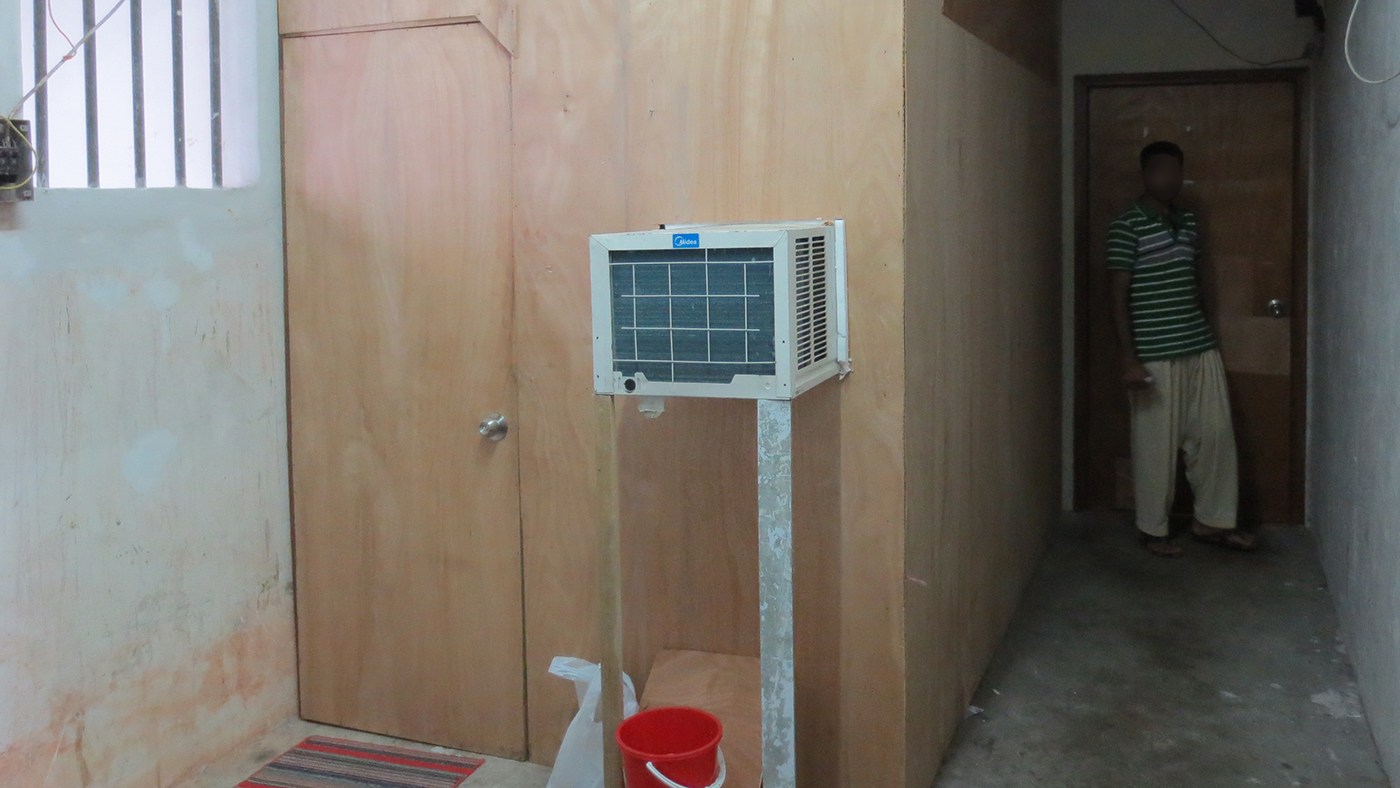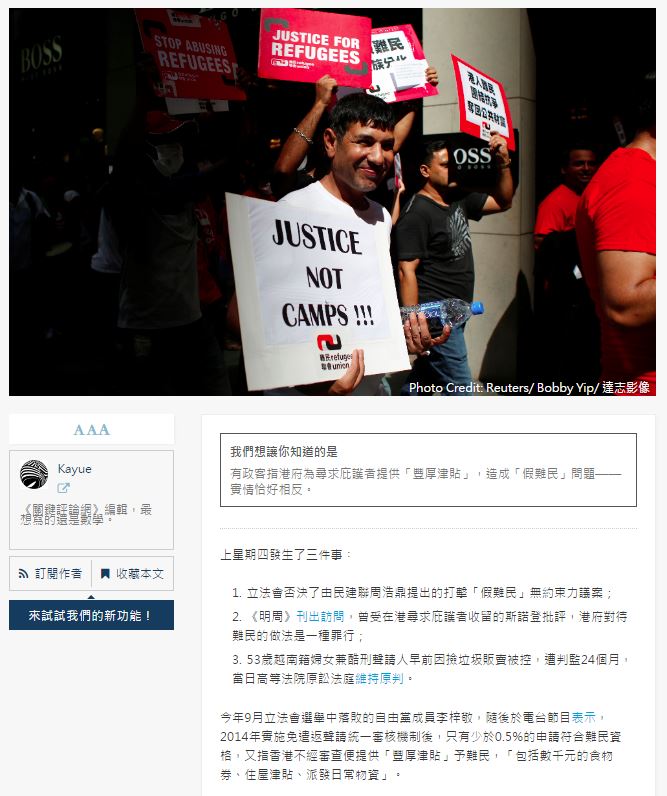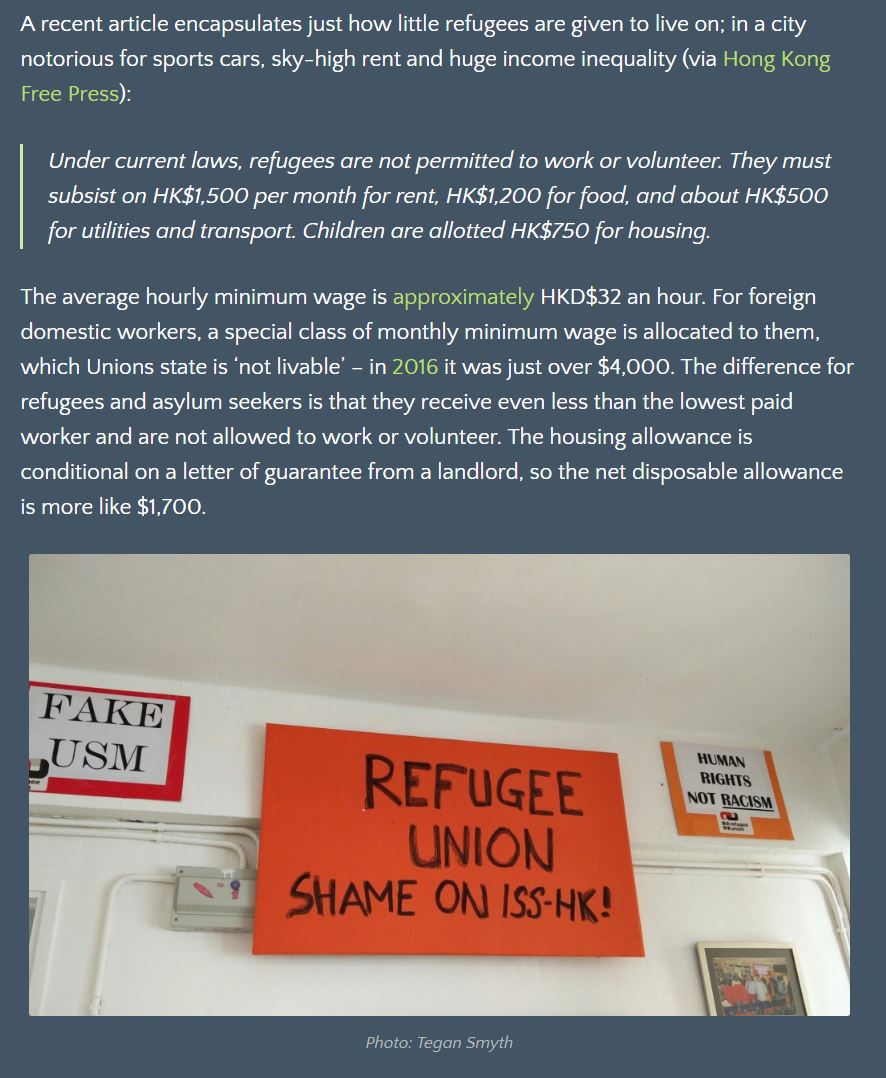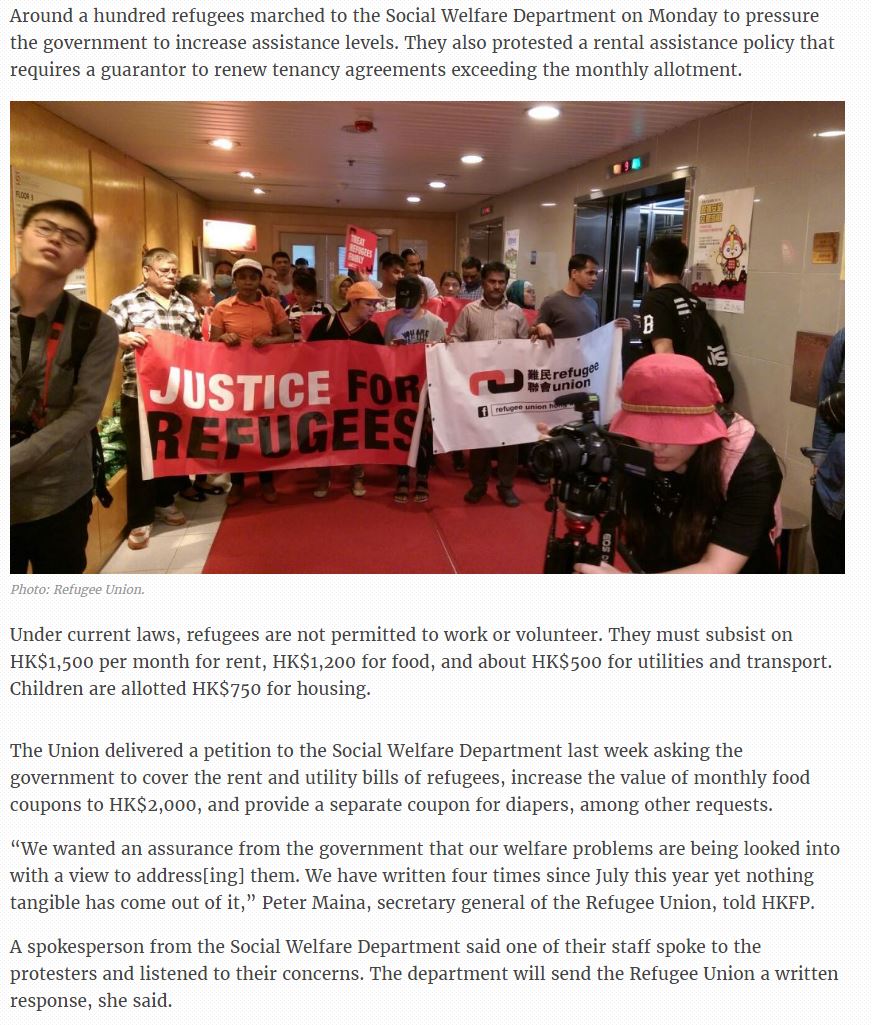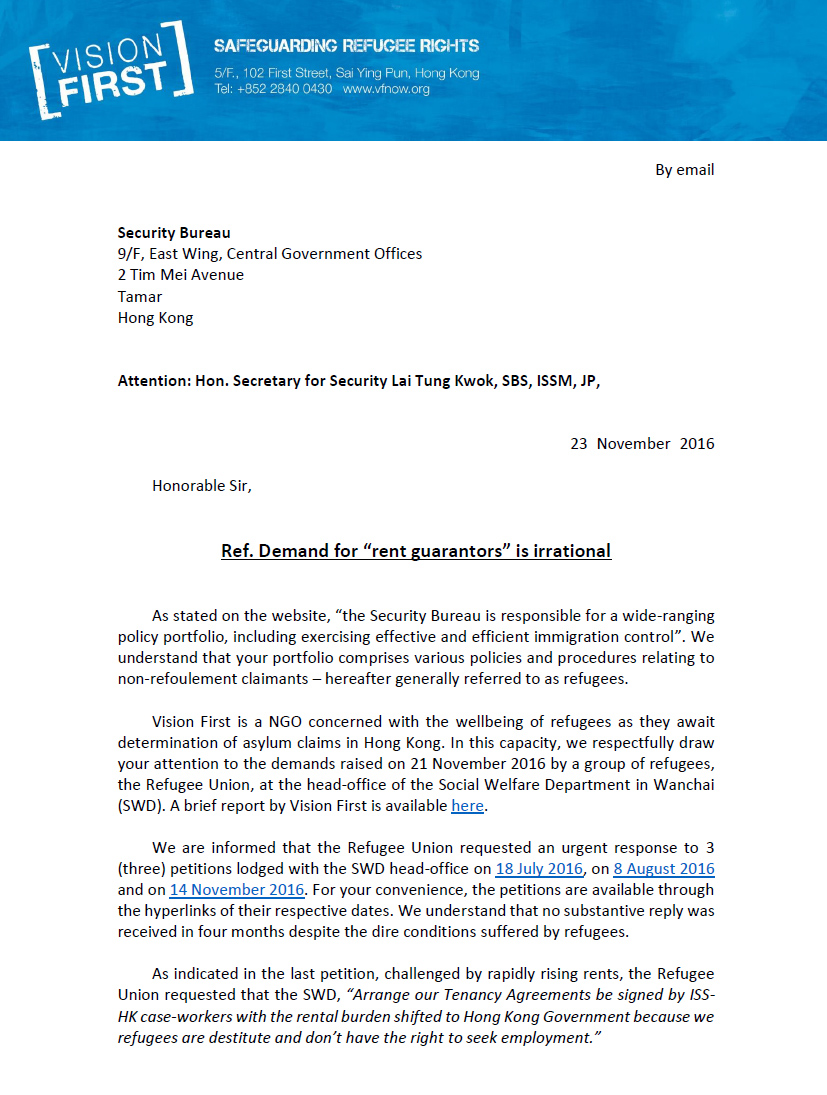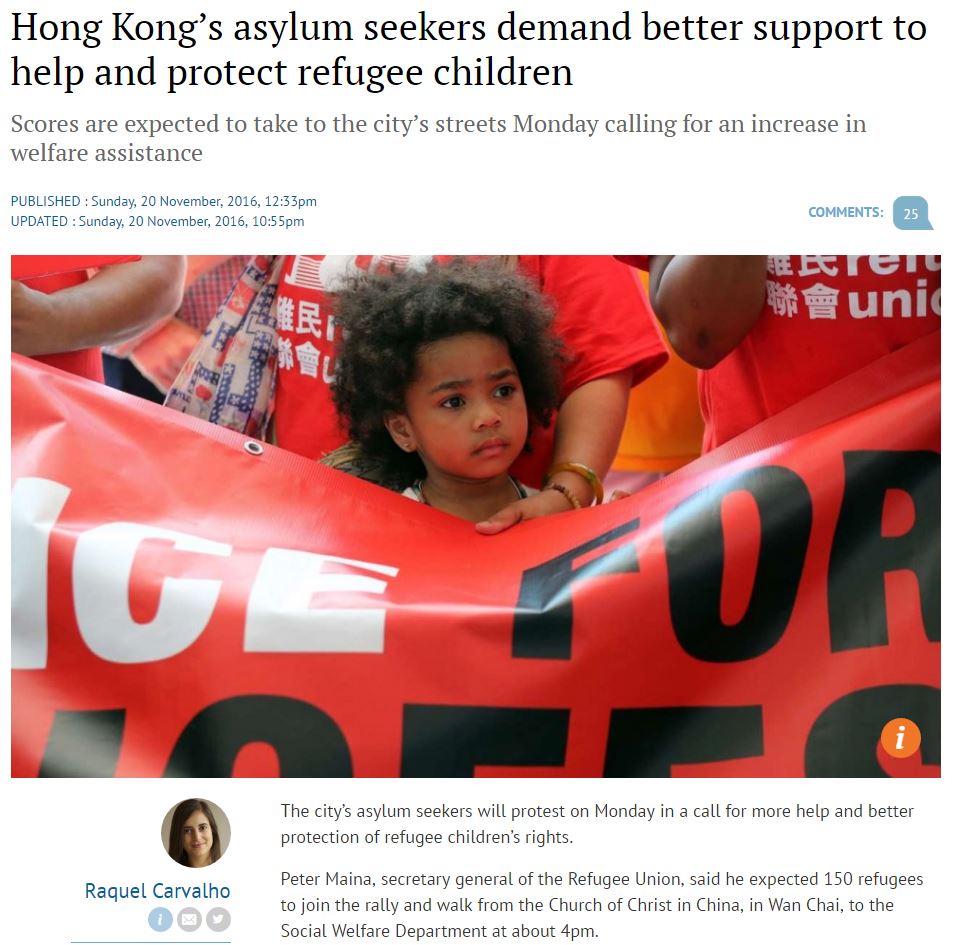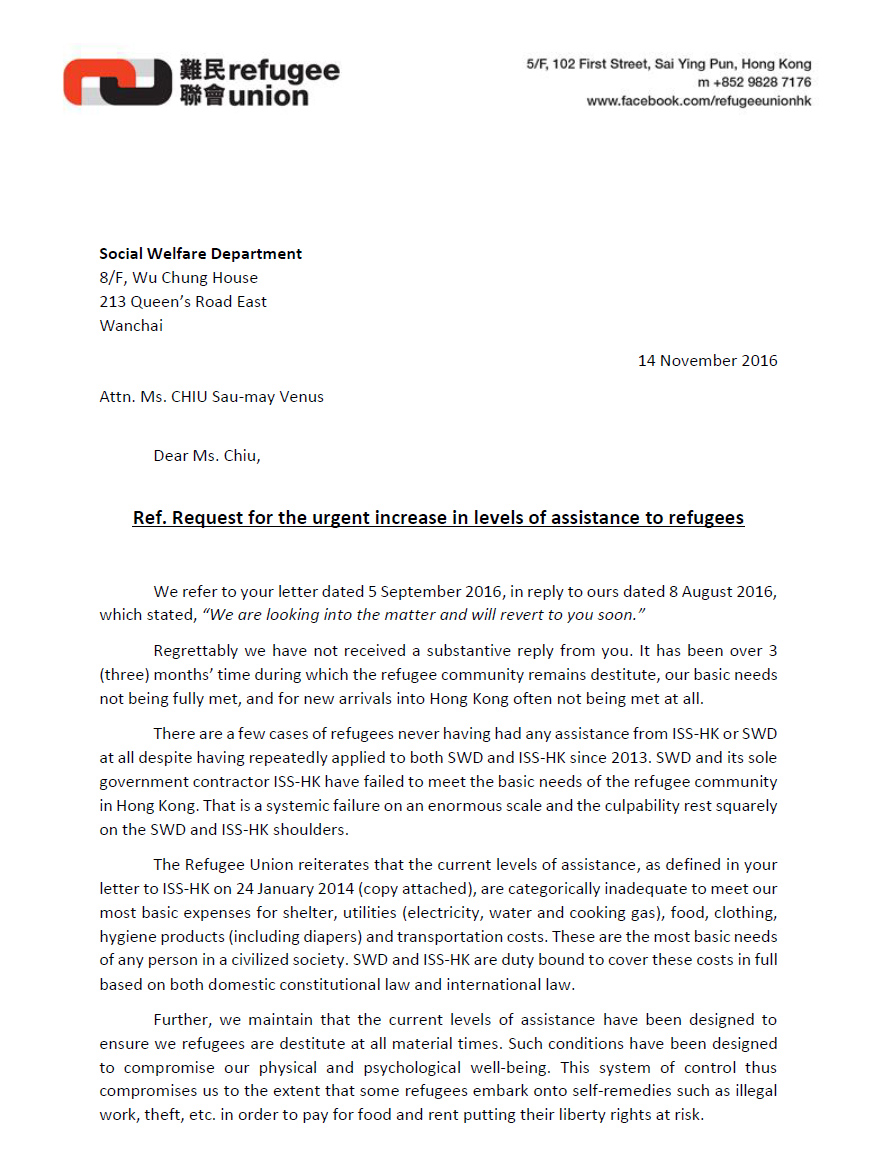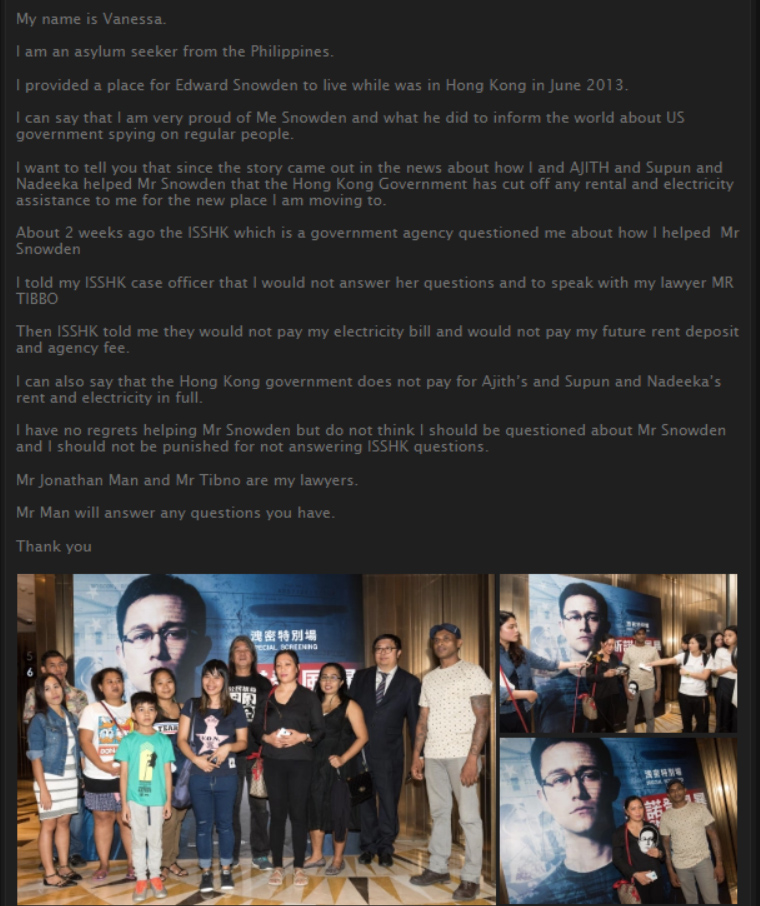SWD arbitrarily violates fundamental human rights of refugees
Dec 7th, 2016 | Advocacy, Food, Government, Housing, Immigration, Rejection, VF Opinion, Welfare | Comment
The Refugee Union published the Social Welfare Department reply to a petition requesting the urgent increase in welfare last enhanced in January 2014. Regrettably, the SWD informs that there are no plans to adjust welfare to interim inflation and skyrocketing rents after three years.
The SWD alleges that the assistance meets basic needs with 1500$ in monthly rent, 40$ a day for groceries and 200$ transportation, with zero provision for clothes, shoes, shaving cream, household detergents, reading glasses, haircuts, mattresses, blankets, cooking and kitchen ware, furniture, diapers, school supplies and transportation, credit for phones, dental service etc. The SWD also maintains that refugees require a single roll of toilet paper per month.
Magnet Effect and Mathematics
Vision First believe there is little substance in the justification that refugees should be denied anything more than a very basic assistance “so as to avoid a magnet effect.” As there is no evidence of any such “Magnet Effect”, it appears this claim is a wholly speculative allegation. Indeed, the Security Bureau and SWD in their own paper issued to the Legislative Council on 8 June 2015 admitted that they have a duty to meet the basic needs of refugees in full. Thus, the Magnet Effect would only apply to extra assistance, above and beyond meeting basic needs.
“The Social Welfare Department (SWD) is charged with the responsibility to provide the assistance programme through non-governmental organisations (NGOs) since April 2006. The objective of the assistance programme is to ensure that non-refoulement claimants will not, during their presence in Hong Kong, become destitute. The assistance programme is not intended to provide them with extra assistance than is necessary to meet their basic needs, so as to avoid any magnet effect which may have serious implications on the sustainability of the assistance programme and on our immigration control.”
In reality, the stringency of immigration controls has not correlation with the well-being of refugees who already sought the protection of Hong Kong Government. The Immigration Department may learn from the past, but the SWD should not raise border integrity as an excuse to oppress local refugees. Further, numbers have raised manifold since aid started in 2006, suggesting that welfare is not the reason why refugees travel here. Denying adequate levels of welfare is just a policy to oppress refugees in order to encourage constructive refoulement. After six months’ of deliberation the SWD confirms that:-
“The Government considers that the current provisions are sufficient to meet the basic needs of service users and has no plan to change the arrangement at this stage.”
However, the Refugee Union’s petition reports that welfare fail to meet the basic needs of virtually all refugees. Almost without exception the assistance by SWD and ISS-HK falls short of rental amounts, utilities, food and travel money, besides lacking the above necessities. In this regard, the suggestion that refugees in need of more assistance should provide justification to ISS-HK is frankly nonsense, as the assistance requested is to meet basic needs, and not to get something above and beyond the costs of such needs.
ISS-HK caseworkers treat requests for such basic assistance with typical rejection. Refugees are actually not asking for more assistance above and beyond meeting their basic needs. They are instead asking ISS-HK and the SWD for full assistance in order to meet basic needs – the difference is crucial. There is even greater fallacy in the advice to seek assistance from ISS-HK to locate suitable rooms because the price of subdivided, cubicle and coffin rooms is close to double the rental allowance. Thus 10,000 refugees evidently “have difficulty in so doing” and caseworkers stand powerless before landlords, despite non-binding promissory letters from rent guarantors, local or overseas. Obviously landlords deem such letters non-bankable. Finally, while it is correct that tenancy agreements reflect the terms and conditions agreed between tenants and landlords, it is wholly unreasonable to expect destitute refugees without the right to work to “ensure he fulfills the responsibilities thereunder”.
Legitimate Expectation
Vision First notes that under Hong Kong law and their own public statements, the Security Bureau and SWD have obligations to meet all basic needs of all refugees in Hong Kong. That is a legitimate expectation the refugee community relies upon. There are no exceptions under the law. It is disturbing that the conduct of these departments’ violates refugees’ rights by putting them at real and immediate risk. The Security Bureau and SWD have failed in their fiduciary duty towards destitute and highly vulnerable refugees.
SWD representations are false
The SWD’s reply to the Refugee Union’s reasonable demands is a false representation to refugees and the public that SWD meets the basic needs of protection claimants. In fact, the SWD arbitrarily violates the fundamental human rights of the vast majority of refugees in Hong Kong.
In our view, this conduct is unconscionable and unlawful as the SWD stubbornly refuses to meet refugees’ basic needs and further states that it will not review the current unsatisfactory levels of assistance. The next step will be a legal challenge.
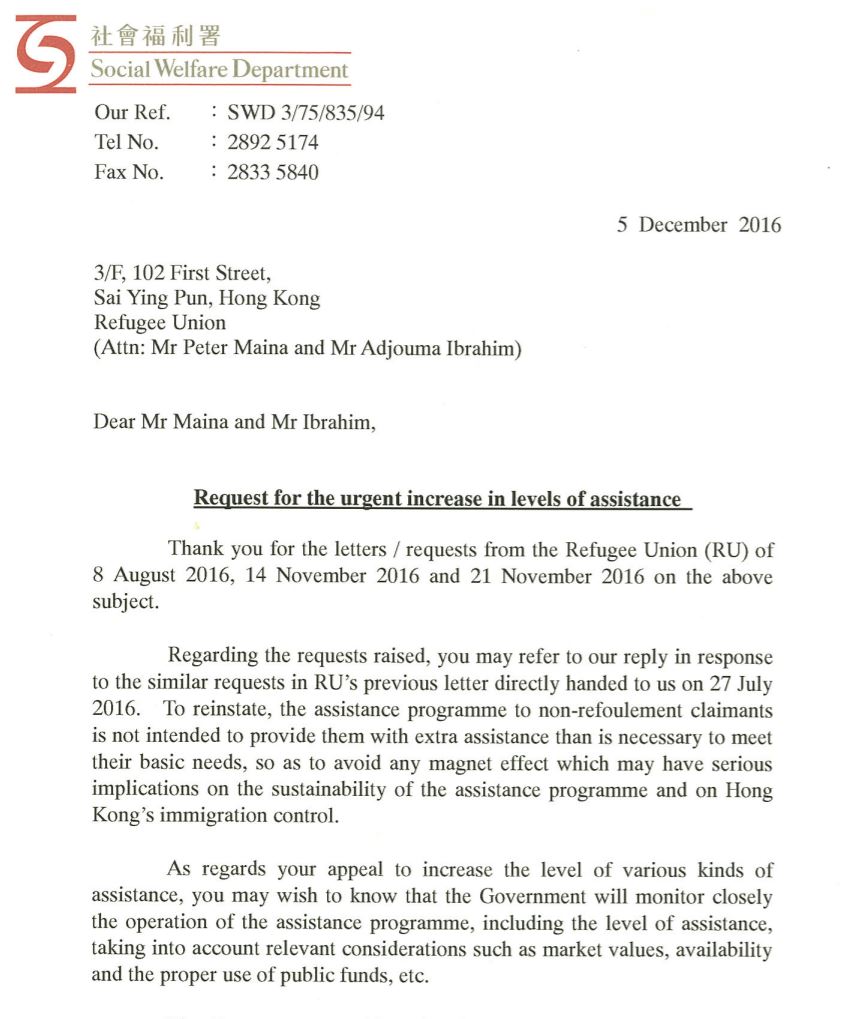
所謂「假難民」問題,其實源自香港政府
Dec 7th, 2016 | Housing, Immigration, Media, Racism, Rejection, Welfare | Comment
Finding a different narrative in Hong Kong
Dec 4th, 2016 | Food, Housing, Immigration, Media, Racism, Rejection, Welfare | Comment
Refugees march to protest limited assistance, rental assistance policy
Nov 23rd, 2016 | Food, Housing, Media, Welfare | Comment
Open letter to Security Bureau – Demand for “rent guarantors” is irrational
Nov 23rd, 2016 | Advocacy, Government, Housing, VF Opinion, Welfare | Comment
Refugees protest failed assistance and ISS-HK’s demand for rent guarantors
Nov 21st, 2016 | Advocacy, Food, Housing, Welfare | Comment
On 21 November 2016 about two hundred refugees staged a remarkable group protest at the Social Welfare Department (SWD) head-office in Wanchai. This protest followed a petition to SWD last week (link), in which the Refugee Union complained about insufficient levels of assistance. Such levels are well-known and haven’t been adjusted since January 2014 when already they ensured that the refugee community subsisted below the poverty line. Since then, inflation has rendered such assistance increasingly unrealistic, and refugees are prohibited from working.
Further, the grim reality that refugees are forced to navigate was recently made harsher by a policy change deployed by ISS-HK, namely, that refugees provide a resident guarantor for the renewal of tenancy agreements. This is an alarmingly punitive policy with a questionable legal basis. It is also a policy that does not have any social basis, as refugees do not necessarily have resident family, or sponsors to share long-term financial burdens.
At the protest, a refugee mother explained, “My caseworker requested I find somebody with ID card to guarantee my new home contract, or they will not pay rent assistance for me and my daughter. Where do I find somebody with ID? I don’t know anyone in Hong Kong who will help me like this.”
Unfortunately, this policy is making life extremely hard for refugees, who are being cast into the very destitution the government assistance is supposed to prevent. Ibrahim, a leader of the Refugee Union, didn’t receive rental assistance for November because he couldn’t provide the ID card copy of a guarantor. His landlord has already threatened to cut off electricity to his flat.
Vision first wonders if ISS-HK will be responsible for refugees and their children being left without power and suffering from malnutrition (no fridge) and discrimination (no lights for homework) as a result of this policy. Ibrahim perceptively observed, “Already the Hong Kong Government and the Chinese media make us look very bad, as if all refugees are criminals who come here to abuse the system. How can we now find residents to guarantee our rent when they read this stuff in the paper?”
Vision First would like to know who devised this policy change? Is it a reaction to high rents for subdivided flats and “coffin rooms” (unaffordable with the 1500$ rent assistance), or has Hong Kong Government lost millions of dollars in security deposits on rooms vacated by refugees who could not afford to pay rent surpluses? Is it yet another trick to force refugees to give up seeking asylum and return home ‘voluntarily’? Or is it a device to force them to work unlawfully, thus filling the labour shortage in the informal economy? And will this poorly advised policy lead to unexpected protests?
Today, guarded by about 20 CID police officers, refugees protested peacefully. A representative of the SWD was persuaded to hear the grievances expressed by the Refugee Union on behalf of its members. The police capably mediated. The SWD officer was reminded that a response to the petition was urgently needed because the refugee community is under tremendous pressure, unable to subsist with the current levels of assistance and new demands for rent guarantors.
With professional composure, the SWD officer listened to the requests of the Refugee Union and revealingly replied, “We received your letter last week and we will handle it with the Security Bureau. We will give you a reply soon. The Refugee Union’s spokesperson, Peter Maina informed, “ISS is requesting a guarantor and if we don’t provide one, they will not pay our rent. So how are we supposed to pay rent?” The officer assured, “As I mentioned, we will reply to you as soon as possible”.
At that point Ibrahim politely interjected, “The issue of the guarantor is very serious. Even for my family ISS did not pay rent this month.” The SWD officer responded, “As I mentioned, we need to handle it with the Security Bureau.” Ibrahim expressed concern, “My situation is very serious because I don’t want to bring my kids to be homeless outside …” The officer assured, “Sure, I understand. Each case is also serious … thank you, thank you” and she retreated behind the police to her office.
Back on Queen’s Road East, the police and the Refugee Union agreed these were pressing issues and future protests will be better organized. Then a liaison officer inquired, “When will the next protest be?” A Refugee Union leader frankly replied, “Next week … two or three times. Great pressure must be put on the SWD because only they can control ISS about this rubbish demand for rent guarantors. It is also SWD’s job to discuss our welfare with the Security Bureau. So they will hear from us again next week and every week until our problems are resolved.”
The right to protest unfair treatment is all that remains for refugees oppressed by a failed welfare system. The Refugee Union put it clearly in their petition, “We maintain that the current levels of assistance have been designed to ensure we refugees are destitute at all material times. Such conditions have been designed to compromise our physical and psychological well-being. This system of control thus compromises us to the extent that some refugees embark onto self-remedies such as illegal work, theft, etc. in order to pay for food and rent putting their liberty rights at risk.”
This is a situation that any level-minded person, whether resident or not, will find unacceptable.
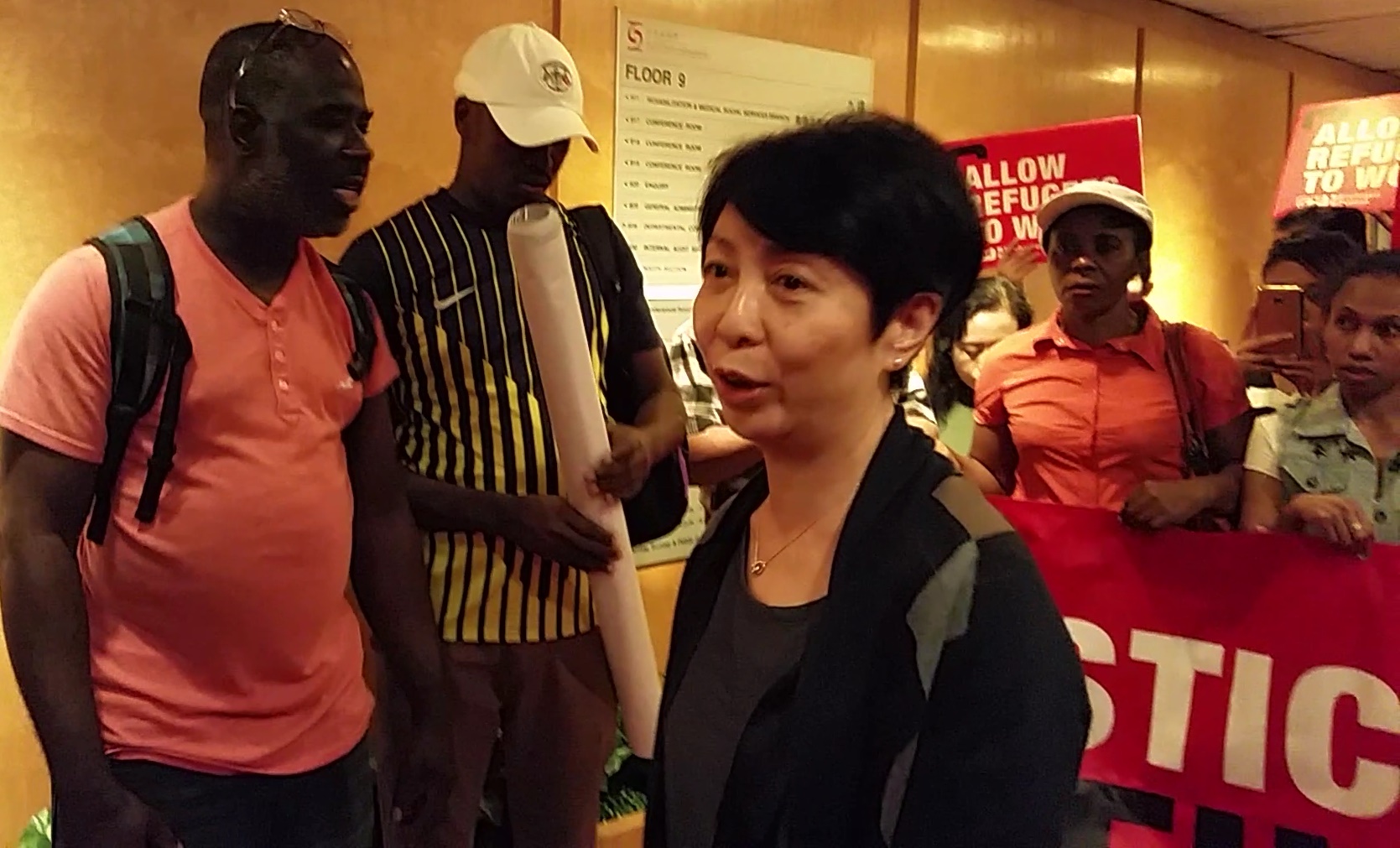
Hong Kong’s asylum seekers demand better support to help and protect refugee children
Nov 21st, 2016 | Food, Housing, Media, Refugee Community, Welfare | Comment
Refugee Union petition to SWD for urgent welfare increase
Nov 14th, 2016 | Advocacy, Food, Government, Housing, Refugee Community, Welfare | Comment
ISSHK refuses to pay all basic costs for refugees who helped Snowden?
Oct 3rd, 2016 | Housing, Media | Comment
Is the noose tightening around the neck of refugees?
Sep 1st, 2016 | Advocacy, Crime, Housing, Immigration, Rejection, VF Opinion, Welfare | Comment
Vision First attended court yesterday to witness two refugee members being prosecuted for allegedly working unlawfully. The prosecutor revealed that the employer will testify as a witness. Bail was denied.
Let’s stop and think. Wouldn’t it normally be the case that prosecutors seek the assistance of the unlawfully employed persons to indict unscrupulous employers, rather than the other way around? Generally speaking, how can refugees conscientiously abide by the law when the material assistance they received fails to meet their most basic needs, rent in particular?
Aside from promoting a regrettable form of xenophobia and widespread misinformation, it appears that the Government is accomplishing little more than slamming the door shut for refugees who mistakenly hoped for a more favorable outcome when seeking refuge in Hong Kong.
A plethora of problems germinates in the the well-known failures of the Unified Screening Mechanism to then spread through various branches of government tasked with dealing with refugees and finally reach deep down in the underground economy where a growing number of destitute asylum seekers are forced to find informal relief.
First, one might consider the statistics published by the Immigration Department informing that, between 2009 and 2016, just 55 of 9214 asylum claims were substantiated. This equates to a success rate of 0.6% for seeking asylum in Hong Kong compared to 30-50% in European countries, for example. Despite authorities being quoted as saying that this rate is indicative of abuse, one might question the credibility of the process that rejects 166 for every 1 case accepted.
That being said, few people realize that successful claimants do not earn the right of abode, will not get ID cards, are prohibited from working under penalty of 36 month prison (maximum sentence) and, together with the other 11,169 asylum seekers, must rely on a monthly assistance of 1200$ in food coupons, 1500$ in rent assistance and about 500$ for utilities and transport.
Second, packaged as ‘humanitarian assistance’ the above assistance was designed to remove the sting of destitution in one of the most expensive cities in the world. That is of little consolation for eleven thousand men, women and children who are expected to cope gratefully, or face hefty prison sentences for ‘breaking the law’ by earning necessary cash on the side.
Such ‘humanitarian assistance’ is in fact more a curse than a blessing. It pulls a seemingly compassionate mask over a draconian policy designed to quash hope in recipients. Overworked magistrates swiftly conclude that as welfare is provided, refugees who work illegally deserve to be incarcerated 15 to 22 months according to plea. Thus sentencing is reduced to little more than ticking the boxes with no consideration of real life circumstances.
Third, the rental crisis is spiraling towards an abyss. On the one hand, contrary to general trends, prices for subdivided rooms have increased to at least 3000$, and availability is very scarce. On the other hand, the SWD contractor ISS-HK is reported by refugees to have started to demand they produce letters from resident sponsors endorsing rent surpluses before new tenancy agreements are accepted for the disbursement of the meagre rent assistance. This could prove challenging.
While some refugees may resourcefully raise funds, these are largely informal arrangements with friends, partners, donors and churches/NGOs that might not translate into sponsorship agreements. “People are going to lose their rooms and become homeless” commented a refugee who visited Vision First for advice.
Fourth, an increasing number of refugees report that the Immigration Department demands detailed written significations. On the one side, the time it takes to lodge new claims is increasing, thus preventing destitute claimants from obtaining assistance. On the other, those whose application fails on signification are likely to abscond and are thus prevented from obtaining assistance. It isn’t hard to guess that these refugees will find support in the underground economy where also the lure of criminal activity is strong.
Fifth, applications for “BOR 2 Claims” appear to be denied to a greater extent than before (Hong Kong Bill of Rights Ordinance, Art. 2). Until recently they were the last resort for rejected USM claimants fearful of imminent removal. Since it seems the government has yet to formulate a policy to deal with these claims, rejecting such applications might be a way contain a problematic surge. However, encouraging refugees to go underground creates graver problems. The maxim “better the devil you know than the devil you don’t” ought to be considered.
Sixth, residents employ refugees due to a severe shortage of unskilled labour. For undocumented workers, monthly salaries in restaurants are up to 8000$ for washing dishes and 15,000$ for cooking. A team can be paid as much as 10,000$ to unload heavy containers, irrespective of time; while the pay is about 600$ a day for demolition work in flats and for night shifts repairing roads for government contractors. Refugees are indeed sought after, and encouraged to introduce friends, because local workers turn their nose on strenuous work, or expect higher payment. In this respect, the government ought to consider a “migrant labour scheme” which refugees could join with an agreement to leave Hong Kong afterwards.
Seventh, a blatant inconsistency in criminal sentencing makes it attractive for desperate refugees to engage in criminal activity such as theft, soliciting or drug trafficking, rather than perform licit work as detailed above. For example, it has come to our attention that refugees might be sentenced to 8 months in prison for trafficking, 4 months for soliciting and a few weeks for shoplifting. Irrespective of moral concerns and social deviancy, the obvious imprisonment advantage is a factor.
These issues combine to overwhelm refugees who are first failed by the government departments tasked to protect and assist them, and then exploited by landlords and employers who unashamedly prey on their need for cash. And when refugees are caught red handed, they are the ones to bear the consequences and the full weight of the law. Indeed, as a perceptive refugee succinctly put it, “Hong Kong is a closed club”, and membership is protected.
It comes as no surprise that certain media outlets foment the flames of propaganda reporting every transgression by refugees who find the noose tightening around their neck in an increasingly toxic and unsustainable environment.
